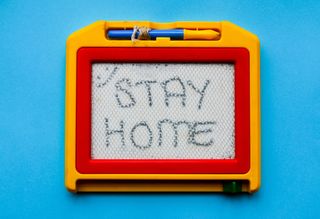Career
Getting Back to Normal
Lessons from a global crisis.
Posted April 30, 2020 Reviewed by Lybi Ma

We are all, it seems, seeking a bit of normal these days. We wonder aloud when things will get back to normal. We wonder what a “new normal” will look like. Will there be school in the fall? When can we travel again? When can we go back to work outside of our homes? When will we feel safe going to the grocery store, the pharmacist, or even just to get a haircut, again?
There is, to be sure, something very healthy, and, well, normal, about these feelings. Because there is something very not normal about being shut in your home and your social circle reduced to those who live there with you or those you can see on the other side of a computer screen. It’s not normal to have your livelihood and sense of security and well-being taken away from you by global forces that seem to be beyond anyone’s control. It’s normal to want a return to routine, and clear expectations, and understood rules for behavior.
Of course, this sort of postulating requires that we examine what “normal” actually means. A very basic dictionary definition is “conforming to a standard; usual, typical, or expected.” There is normal, then, according to the individual (this is the normal behavior that we expect out of this person) and there is normal according to organizational, societal, or cultural rules (this is the standard behavior for people belonging to this group). Put this way, the idea of normality, the condition of being normal, seems benign almost, something to strive for.
And yet, as Brandon Ambrosino notes in this recent piece for the BBC, the etymology of the word has much darker effects. We can use the idea of “normal” as a weapon, a means to classify (you are normal, you are not) or even excuse abnormal behavior (if everyone is doing it, then it becomes, in effect, “normal”). And, as he notes, this desire to “get back to normal” requires a simultaneous desire that things do indeed change: “So we kind of want to go back to where we were, but we also kind of don’t. We want things to be the same, but we also want them to be different.” In other words, I want to be able to travel again, but I want the travel industry to completely overhaul their systems and processes so that I feel safe doing so.
Beyond all that, we must remind ourselves that there is considerable arrogance and privilege in the sweeping idea that we all need or want to “get back to normal,” which assumes that for everyone what was normal before is worth getting back to. For many, “normal” looks like famine, poverty, discrimination, abuse, struggle, hardship, and more. Not everyone is wondering when they can get back to their regular Starbucks or Target run. And for those of us fortunate enough to still have steady employment and health benefits, we must question the inherent privilege in wondering aloud when our organizations and offices will reopen and return to “normal operating business.”
So, holding that privilege in one hand, I would like, with the other, to offer up that it is OK to want that routine, and order, and sense of stability and security that for many of us was our life before this new normal. And, I would like to offer some suggestions for ways that we might emerge from this moment and hold onto some lessons, so that perhaps whatever “normal” looks like in the future, it actually is better than what we had before.
- Be willing to do work differently. Change is hard. But sometimes, in moments like these, change gives us an opportunity to approach work differently. We can view this as a moment to adapt, until we no longer have to, when hopefully we will return to the way we’ve always done things. Or, we can view this as an opportunity to rethink the ways we’ve always done things, and hold space for something possibly better. We’ve seen the way that teachers and institutions of education have shifted to online learning almost overnight. Most would say that they don’t want to live there forever. But what are the possibilities for incorporating technology into traditional in-person formats in the future, that might lead to augmented learning experiences for students? I hope as we go back to “normal” we continue to be open to the possibilities for new ways of working, even when we don’t have to be.
- Uphold and maintain the relationships that matter. If you’re working right now, and especially if you’re working for an office, then you’ve been in way too many Zoom meetings. For some reason, it seems, “work from home” has become “micromanage your employees.” But that’s another topic. What has been lovely about this use of video technology have been those unexpected (and planned) meetings with friends and family members, which most of us would never have considered holding, before. Let’s hope that we continue to build intentional community through meaningful interactions with the people who truly matter in our lives.
- Stop striving for (and expecting) unrealistic expectations of success. Near the beginning of this crisis, I was on a Zoom meeting (ahem, see above) with a group of young professionals who told me about the pressures they felt to “win the quarantine.” Apparently, there is great pressure to emerge from this moment with a new fully-formed side business, a new hobby mastered, fluent in six new languages, and carrying six-pack abs. To this I say, stop it. Even before this crisis, we were a country of burned out, overworked, and overwhelmed professionals. And it’s only getting worse. According to a recent study, 88 percent of workers reported experiencing moderate to extreme stress over the past four to six weeks and “69 percent of workers claimed this was the most stressful time of their entire professional career, including major events like the September 11 terror attacks, the 2008 Great Recession, and others. Every demographic, including adults over the age of 55, rated COVID-19 as the most stressful time.” If you’re managing people, stop expecting them to be “on” all the time, just because we have the technology. And if you’re working, start setting and upholding some real and clear boundaries for your mental health.
- Pay attention to your health. Speaking of health, never before, perhaps, have we been so universally focused on our health and wellbeing. If we learn anything from this crisis, it should be that we have a great responsibility to take care of our own health. At a very basic level, now, that means practicing social distancing, wearing a mask, paying attention to your symptoms. But it also means watching what you eat and drink, getting regular exercise, taking breaks from social media and other destructive influences. Even when the threat of this virus has passed, when there is a vaccine and we no longer have to give thought to whether it’s a smart choice to go Trader Joe’s, we can and should still make the choice, every single day, to take care of our bodies and our minds in the best ways that we can. Virus or not, you only get one of each.
- Shut down and reboot. Finally, and not unrelated to the points above, we all need to give ourselves and others permission to rest and to take breaks. Just like your computer, you need to shut down and reboot at least once a day. I know way too many people right now who are “just barely holding on” or “just trying to survive.” We aren’t giving nearly enough attention to what it means when we expect full-time work and full-time homeschooling and full-time caregiving from one person. I am gravely concerned that if the virus doesn’t kill us, that these expectations most certainly will. Unless you are truly saving lives right now (and if you are, bless you), then it’s worth asking: Is this a matter of life and death? Is anyone dying on your watch because you didn’t get that report in, or you didn’t make that meeting, or you missed a deadline? Probably not. This doesn’t mean that you shouldn’t show up and do the work. But give yourself permission, at least once a day, to slack off, to watch trashy TV, to play in the yard with your kids. And if you’re managing people, don’t just say, “It’s OK to take a break.” Ask, “When are you taking a break today?” Rest. It matters.
These are lessons I hope that we are learning from this moment but I hope won’t be lost in this moment. It’s normal to look for something normal in all of this. And, this is a moment for us all to ask, what’s so great about normal, anyway? I’ve said it before and will keep saying it: if we don’t emerge from this moment having learned anything, having gained some perspective on what really matters, then what a waste this all will have been. We owe ourselves, and the people who actually are putting themselves on the line for us, that much at least.


